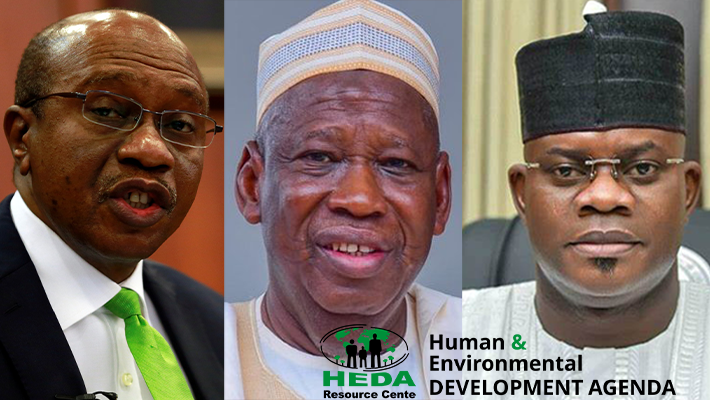Emefiele, Ganduje, Yahaya Bello’s scandals make top 100 corruption cases in Nigeria
The Human Environmental Development Agenda (HEDA) has named former Governors Abdullahi Ganduje and Yahaya Bello of Kogi and CBN governor Godwin Emefiele on its list of 100 corruption cases in Nigeria.
On July 11, 2024, Mr Ganduje, fifth on the list, was arraigned by the Kano government for alleged bribery involving $413,000 and N1.38 billion.
Mr Ganduje, his wife Hafsat, his son, Umar and six others are accused of receiving kickbacks from contractors in 2016 and 2017 and conspiring to convert funds meant for healthcare equipment between 2020 and 2021.
Mr Bello, 28th on the list, is facing charges of financial misappropriation and money laundering amounting to N80.2 billion and N10 billion.
Also on the list as the 27th most corrupt case is Mr Emefiele’s for acquiring illicit assets worth about N11.4 billion.
Others who made the list of the top 100 corruption cases are Orji Uzor Kalu, for N7.6 billion money laundering, Ladi Adebutu, Ogun PDP candidate in the March 18 governorship election, Ikedi Ohakim, for a N270 million money laundering allegation.
Ex-Governor Willie Obiano’s N4 billion money laundering case is also on the list.
HEDA boss Olanrewaju Suraju said the event was to create awareness on the top corruption cases in Nigeria, citing the importance of exposing perpetrators and the involvement of the youths in this.
Mr Suraju said, “I believe that we must be hopeful in our fight against corruption, and also the sensitisation of the youths in this will go a long way to make things better.
“As you can observe, constantly doing this will call out the perpetrators of these corrupt practices and also create a sense of awareness of the ills in others who might be intending to do this.”
The event’s chairman, Funmi Falana, pointed out the need to place a watch on the country exporting corruption and the ones receiving it.
“If there is no receiver, the taker will be reluctant to take. (We are) not just talking about how our money is being taken away. We also want to see how we can repatriate the money taken away to the country that it has been taken to,” said Ms Falana.
HEDA organised the programme in collaboration with the MacArthur Foundation.

